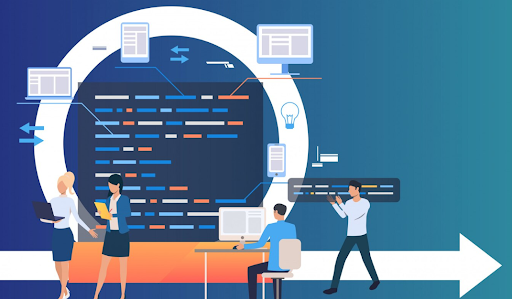Django vs Flask: Why Hiring Django Developers Is the Right Choice for Your Business
- Kritika Verma
- April 29, 2025
- 5 Minute Read

Python offers powerful web frameworks that streamline web development and ensure scalability for modern businesses. Among the most popular options are Django and Flask, each with its own advantages.
Choosing the right framework is critical as it influences development speed, application performance, and long-term maintenance. Django delivers a full-stack solution with built-in features, while Flask offers flexibility for lightweight applications. This distinction becomes even more important when hiring Django developers.
In this blog, we explore Django vs. Flask, helping you determine which framework and developer expertise best suits your business goals.
Understanding Django and Flask
Choosing between Django and Flask depends on your project’s scope, complexity, and long-term business needs. Understanding how each framework functions helps businesses make informed decisions when hiring Django developers or evaluating alternatives.
What is Django?
Django is a full-stack Python web framework designed to simplify complex application development. It includes built-in features like authentication, admin panels, form handling, and a powerful ORM. These tools accelerate development without compromising performance or security.
Django is used when businesses require scalable, secure, and maintainable applications. It is ideal for large-scale projects with tight deadlines and structured data requirements.
Companies such as Pinterest, Instagram, and Mozilla benefit from Django’s ability to handle heavy traffic and data-driven workflows. Its modular structure and reusable components allow developers to deliver projects faster while maintaining code quality.
What is Flask?
Flask is a lightweight Python web framework known for its simplicity and flexibility. Unlike Django, it provides minimal features out of the box, making it ideal for building custom applications from scratch.
Flask is often used in projects that require granular control over components or where minimal architecture is preferred. It suits startups and experimental projects with limited scope.
Due to its adaptability, well-known platforms like Netflix, Reddit, and Lyft have used Flask for microservices and internal tools. Developers prefer Flask when they need complete control over the tech stack and application flow.
Key Differences Between Django and Flask
Understanding Django vs. Flask
is essential before making a framework decision. Each has distinct strengths that cater to different project types. The table below compares these two based on core development considerations:
Criteria | Django | Flask |
Architecture | Full-stack framework with built-in admin, ORM, and authentication | Microframework offering modular components as needed |
| Ease of Use and Learning | Slightly steeper learning curve due to its built-in features | Easier to grasp for beginners with simple, minimalistic structure |
Community and Documentation | Large community with extensive documentation and third-party packages | Active community but smaller than Django’s |
| Scalability and Performance | Built to scale; handles large, complex applications efficiently | Lightweight and faster for small to mid-sized apps |
Security Features | Strong built-in security (CSRF, SQL injection, XSS protection) | Basic security; needs manual implementation or third-party tools |
| Database and ORM Support | Includes Django ORM with migrations, admin, and form support | Lets you choose any ORM like SQLAlchemy; requires manual setup |
Development Speed | Faster development with built-in components | Offers flexibility but needs more configuration |
Why Django Is the Better Choice for Businesses
Django offers clear advantages over Flask for businesses looking to build secure, scalable, and efficient web applications.
1. Faster Development with Built-in Features
Django includes everything from user authentication to an admin panel. These built-in tools significantly reduce development time and effort, allowing developers to focus more on core functionality rather than repetitive coding tasks.
2. Better Security and Maintenance
Django comes with built-in security practices that protect against threats like SQL injection and cross-site scripting. Its structured framework promotes maintainable, clean code that’s easier to scale and manage long-term.
3. Strong Community and Enterprise Support
The Django community is large and active and constantly improving the ecosystem. This support helps businesses quickly resolve technical issues and adopt best practices. Enterprise platforms widely use Django because of its maturity and ecosystem reliability.
4. Suitability for Complex, Scalable Applications
Leading tech platforms have proven Django’s ability to support scalable, complex business applications. Companies like Instagram use Django to manage billions of user interactions, while Disqus relies on it to serve millions of blog comments daily.
Mozilla has adopted Django for secure internal and external tools, and Pinterest, in its early days, leveraged Django for rapid prototyping.

Why Hiring Django Developers Is the Right Choice
Choosing skilled professionals when building with Django ensures your application is secure, scalable, and efficient.
1. Expertise in Scalable and Secure Applications
Django developers are trained to manage complex business logic with secure, modular architecture. Key Django developer skills include Python proficiency, ORM handling, REST API development, and experience with version control tools. These competencies help streamline backend workflows and safeguard your application from vulnerabilities.
2. Faster Project Completion and Reduced Costs
With Django’s built-in tools, like admin dashboards, authentication, and form validation, developers reduce the time spent on setup and boilerplate code. This accelerates project timelines and lowers overall development costs.
In the United States, the average Django developer’s salary is $85,704/year. Entry-level positions start at $97,573, while experienced developers earn up to $156,000/year.
3. Access to a Large Talent Pool
Django remains one of the most popular Python frameworks, leading to a vast and growing pool of skilled developers. Whether hiring through freelance platforms, agencies, or tech job boards, businesses can access talent across experience levels.
To hire Django developers effectively, assess technical interviews, evaluate portfolios, and ensure candidates have proven experience with scalable, secure Django projects.

Conclusion
Django and Flask both offer value, but Django stands out for businesses needing speed, scalability, and built-in security. Its all-in-one approach reduces development time while maintaining high code quality and performance.
Django supports end-to-end development needs, from managing complex databases to securely handling user authentication. Hiring Django developers ensures access to professionals skilled in delivering robust, enterprise-ready applications.
Django remains the strategic framework of choice for companies aiming to build fast, grow efficiently, and maintain long-term reliability.
Frequently Asked Questions
What are the main differences between Django and Flask?
Django is a full-stack framework with built-in tools. On the other hand, Flask is minimal and better suited for custom lightweight applications.
Is Django better for large-scale applications?
Yes. Django supports scalability, security, and complex workflows, making it ideal for high-traffic, data-driven platforms.
Why do startups prefer Django over Flask?
Startups value Django for its rapid development, built-in features, and ability to scale as their product grows.
What types of businesses benefit the most from Django?
Django’s security, flexibility, and rapid deployment benefit e-commerce, media, SaaS, and finance companies.
What skills should I look for in a Django developer?
Look for skills in Python, Django ORM, REST API development, security practices, and familiarity with databases and version control.

Thank you for submitting the details!
We will keep your information safe. Feel free to contact us with any questions at hello@uplers.com
Please check your email for next steps shared by Robert.














